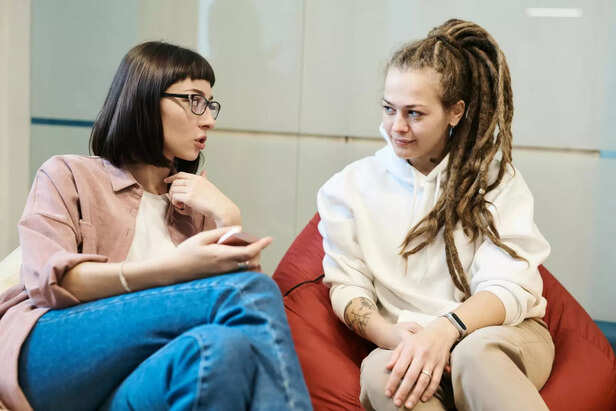How to Get People to Reveal Their Secrets (Without Asking) - Chanakya Niti
Riya Kumari | Jun 26, 2025, 18:08 IST
Chanakya
( Image credit : Times Life Bureau )
Okay, so here’s the scene: You're at a dinner party, a little bored, swirling your drink, half-listening to someone drone on about their keto journey—and then, suddenly, someone drops a bomb. Not literally (we’re not in a Netflix thriller), but emotionally. Like, “I don’t think I even love him anymore,” or “I hacked my boss’s emails.” And you're just there, blinking, pretending to sip your wine while internally screaming OH MY GOD WHAT.
We live in a world obsessed with speaking. Everyone wants to be heard. To be seen. To be understood. But the ones who truly hold power? They don’t speak. They observe. In a time where information is currency, the ability to know without being told is more valuable than all the degrees on a wall. And this isn’t manipulation. It’s discernment. The kind that comes from understanding how the human mind works—and how it betrays itself. Over 2,000 years ago, Chanakya—the brilliant strategist behind the Mauryan Empire—He simply understood people. He studied their silences more than their words. Their patterns more than their promises. And he knew: Secrets don’t hide in shadows. They hide in plain sight—beneath the ego, the fear, and the need to belong. So here’s how to see them.
1. Observe Emotion Before Words

Chanakya once said, “A person’s real nature is revealed in times of crisis, not comfort.”
We can fake words. We cannot fake reactions. Before someone speaks, they signal. In a hesitation. A shift in eye contact. A tightening of the jaw. That’s where the truth starts leaking. Not in the answer they give—but in the pause before they give it. You don’t need to interrogate anyone. You just need to notice what made them uncomfortable. Don’t interrupt. Don’t react. Just watch. People aren’t used to being heard. They’re used to being one-upped.
So when you let them speak—really speak—they get high off the attention. Their ego stretches. Their filter thins. And then, pop—out comes something they didn’t mean to say. When someone changes their tone, posture, or gaze during a conversation—don’t respond. Just watch. They’ve already told you more than they meant to.
2. Don’t Ask for Secrets, Create Space for Them

Secrets aren’t stolen. They’re surrendered. But only when someone feels safe enough to be seen—and not judged. Chanakya never pushed people to speak. He listened long enough for them to want to. Today, that means: listen without interrupting. Sit without rushing. And respond without fixing.
The most disarming words are not “Tell me the truth.”
They are “It’s okay. I understand.”
If your presence feels safe, people will tell you what they hide from themselves. Want someone to trust you fast? Become them. Match their energy. Use their words. Reflect their posture. People love themselves—so if you become their mirror, they’ll love you. And the more they feel seen, the more they’ll show. Mirroring triggers a primal bonding response. When they feel you’re “like them,” their guard drops. That’s your way in.
3. Ask Questions That Uncover Motive, Not Memory

Most people hide what they did. But what they can’t hide is why they did it. Instead of chasing facts, ask them about feelings. Ask what they feared. What made them hesitate. What they didn’t say—when they could have.
Chanakya taught: “The one who understands the cause controls the effect.”
Try this instead of direct questioning:
“What were you trying to protect when you made that choice?”
“If no one would judge you, what would you say differently?”
These aren’t questions. They’re keys. Tell a “harmless” personal story—one that sounds a little messy. Watch how fast they respond with something messier. Humans are wired for reciprocity. Vulnerability invites vulnerability. Even if yours is scripted.
4. Reveal, to Be Revealed

One of Chanakya’s most powerful tools wasn’t intelligence—it was relatability. People open up to those who are human. Who show scars. Who admit what they once hid. If you want people to open their world to you, show them that you won’t weaponize what they offer. Reveal a truth—not to impress them, but to relieve them.
Not “Look how wise I am.”
But “I’ve been there too.”
This isn’t strategy. This is being human in a world that rewards masks.
5. Let Silence Be the Mirror

Most people rush to fill silence. Because in silence, our truths echo back louder than we’re ready for.
But Chanakya knew silence was never empty—it was a mirror. The longer you hold it up, the more a person will reveal, just to make the reflection easier to bear. Try this: After someone tells you something important… say nothing.
Let the silence stretch.
Let them sit with what they just said.
You’ll be shocked how often they’ll fill it—not with noise, but with confession. When someone slips—body language shift, voice crack, breath hitch—freeze. Drop a beat. Tilt your head. Say nothing. Let the discomfort cook. The moment someone feels “caught,” they often over-explain to recover. That explanation = the secret.
6. Study Patterns, Not Moments

A secret is rarely hidden in one moment. It’s hidden in repetition.
If someone over-explains something simple, or under-reacts to something painful—your job is not to confront.
Your job is to notice.
And connect the dots they think are invisible.
7. Use Curiosity Without Expectation

People don’t open up when they feel interrogated. They open up when they feel curiosity without agenda. Chanakya didn’t corner his enemies—he made them talk themselves into surrender. He simply asked the right thing at the right time, and then let the silence do the rest.
If you’re genuinely curious about a person—not what they did, but who they are—they’ll begin to answer questions you never asked. This is deep-end territory. You plant ideas. Not questions. Not commands. Ideas. Then… walk away. Leave them with that seed. They’ll think about it. Obsess over it. Then tell you exactly what they didn’t want to It’s called priming. You introduce a concept subtly. The mind obsesses. Eventually, it spills.
In Closing:
This isn’t magic. It’s pattern. Human nature on autopilot. Chanakya decoded it centuries ago. Just remember: The real masters never ask. They just… wait. And listen. Because the loudest secrets are the ones people beg to whisper. In a world of noise, if you can master the stillness of observation, the humility of listening, and the patience of presence—you’ll never need to ask for secrets. They will arrive on their own. He who knows when to speak, and more importantly—when not to—is already three steps ahead.
1. Observe Emotion Before Words

Conversation
( Image credit : Pexels )
Chanakya once said, “A person’s real nature is revealed in times of crisis, not comfort.”
We can fake words. We cannot fake reactions. Before someone speaks, they signal. In a hesitation. A shift in eye contact. A tightening of the jaw. That’s where the truth starts leaking. Not in the answer they give—but in the pause before they give it. You don’t need to interrogate anyone. You just need to notice what made them uncomfortable. Don’t interrupt. Don’t react. Just watch. People aren’t used to being heard. They’re used to being one-upped.
So when you let them speak—really speak—they get high off the attention. Their ego stretches. Their filter thins. And then, pop—out comes something they didn’t mean to say. When someone changes their tone, posture, or gaze during a conversation—don’t respond. Just watch. They’ve already told you more than they meant to.
2. Don’t Ask for Secrets, Create Space for Them

Understand
( Image credit : Pexels )
Secrets aren’t stolen. They’re surrendered. But only when someone feels safe enough to be seen—and not judged. Chanakya never pushed people to speak. He listened long enough for them to want to. Today, that means: listen without interrupting. Sit without rushing. And respond without fixing.
The most disarming words are not “Tell me the truth.”
They are “It’s okay. I understand.”
If your presence feels safe, people will tell you what they hide from themselves. Want someone to trust you fast? Become them. Match their energy. Use their words. Reflect their posture. People love themselves—so if you become their mirror, they’ll love you. And the more they feel seen, the more they’ll show. Mirroring triggers a primal bonding response. When they feel you’re “like them,” their guard drops. That’s your way in.
3. Ask Questions That Uncover Motive, Not Memory

Listen
( Image credit : Pexels )
Most people hide what they did. But what they can’t hide is why they did it. Instead of chasing facts, ask them about feelings. Ask what they feared. What made them hesitate. What they didn’t say—when they could have.
Chanakya taught: “The one who understands the cause controls the effect.”
Try this instead of direct questioning:
“What were you trying to protect when you made that choice?”
“If no one would judge you, what would you say differently?”
These aren’t questions. They’re keys. Tell a “harmless” personal story—one that sounds a little messy. Watch how fast they respond with something messier. Humans are wired for reciprocity. Vulnerability invites vulnerability. Even if yours is scripted.
4. Reveal, to Be Revealed

Trust
( Image credit : Pexels )
One of Chanakya’s most powerful tools wasn’t intelligence—it was relatability. People open up to those who are human. Who show scars. Who admit what they once hid. If you want people to open their world to you, show them that you won’t weaponize what they offer. Reveal a truth—not to impress them, but to relieve them.
Not “Look how wise I am.”
But “I’ve been there too.”
This isn’t strategy. This is being human in a world that rewards masks.
5. Let Silence Be the Mirror

Secret
( Image credit : Pexels )
Most people rush to fill silence. Because in silence, our truths echo back louder than we’re ready for.
But Chanakya knew silence was never empty—it was a mirror. The longer you hold it up, the more a person will reveal, just to make the reflection easier to bear. Try this: After someone tells you something important… say nothing.
Let the silence stretch.
Let them sit with what they just said.
You’ll be shocked how often they’ll fill it—not with noise, but with confession. When someone slips—body language shift, voice crack, breath hitch—freeze. Drop a beat. Tilt your head. Say nothing. Let the discomfort cook. The moment someone feels “caught,” they often over-explain to recover. That explanation = the secret.
6. Study Patterns, Not Moments

Body language
( Image credit : Pexels )
A secret is rarely hidden in one moment. It’s hidden in repetition.
- In how they always get defensive when a certain name comes up.
- In how they talk too much about something they claim “doesn’t matter.”
- In the way they explain things… that were never questioned.
If someone over-explains something simple, or under-reacts to something painful—your job is not to confront.
Your job is to notice.
And connect the dots they think are invisible.
7. Use Curiosity Without Expectation

Curious
( Image credit : Pexels )
People don’t open up when they feel interrogated. They open up when they feel curiosity without agenda. Chanakya didn’t corner his enemies—he made them talk themselves into surrender. He simply asked the right thing at the right time, and then let the silence do the rest.
If you’re genuinely curious about a person—not what they did, but who they are—they’ll begin to answer questions you never asked. This is deep-end territory. You plant ideas. Not questions. Not commands. Ideas. Then… walk away. Leave them with that seed. They’ll think about it. Obsess over it. Then tell you exactly what they didn’t want to It’s called priming. You introduce a concept subtly. The mind obsesses. Eventually, it spills.
